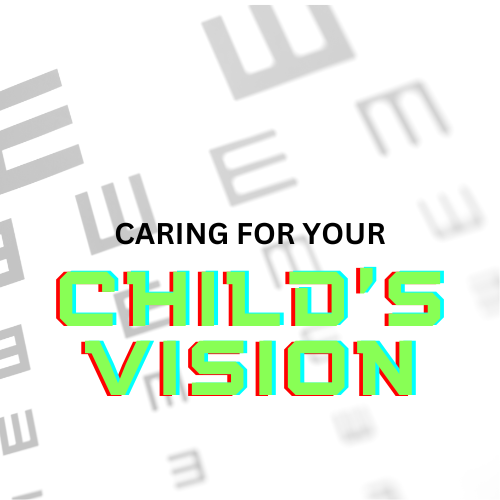Caring for Your Child’s Vision


Parents play a crucial role in ensuring the best care for their child’s vision. Here are some steps parents can take to support their child’s eye health and vision:
Regular Eye Examinations: Schedule comprehensive eye examinations for your child with a pediatric ophthalmologist or optometrist. These exams can help detect vision problems, eye conditions, or abnormalities early, even if your child doesn’t exhibit obvious symptoms. Follow recommended examination schedules, such as newborn screenings, well-child visits, and regular check-ups, as advised by your healthcare provider.
Monitor Developmental Milestones: Be attentive to your child’s visual developmental milestones, such as tracking objects with their eyes, making eye contact, and focusing on objects at different distances. Any delays or concerns should be discussed with a healthcare professional.
Eye Safety: Promote eye safety by ensuring that your child wears appropriate protective eyewear during activities that pose a risk of eye injury, such as sports or home improvement projects. Keep dangerous objects, chemicals, and small items out of your child’s reach to prevent accidents that could harm their eyes.
Proper Nutrition: Provide a balanced diet rich in vitamins and minerals.Encourage your child to eat a variety of fruits, vegetables, and foods that contain these nutrients. Some key nutrients that play a crucial role in eye development and health include vitamin A, vitamin C, vitamin E, zinc, omega-3 fatty acids, lutein, and zeaxanthin. These nutrients can be found in a variety of foods, including fruits, vegetables, leafy greens, nuts, seeds, and fish.
Limit Screen Time: Set age-appropriate limits on screen time for digital devices, such as smartphones, tablets, and computers. Excessive screen time can strain the eyes and potentially affect vision. Encourage breaks from screens and outdoor activities to promote overall eye health.
Eye Hygiene: Teach your child the importance of washing their hands before touching their eyes or face to prevent eye infections.
Manage Allergies: If your child has allergies that affect their eyes, work with a healthcare provider to develop a management plan. This may include allergy medications and strategies to reduce allergen exposure.
Recognize Signs of Vision Problems: Be aware of signs of vision problems, such as squinting, eye rubbing, frequent headaches, eye redness, excessive tearing, or difficulty focusing. If you notice any of these signs, seek prompt evaluation by an eye care specialist.
Create an Eye-Friendly Environment: Ensure proper lighting in your home to reduce eye strain. Provide sufficient ambient and task lighting, especially in study or play areas. Encourage your child to read or work in well-lit areas to prevent eye fatigue.
Lead by Example: Be a role model for good eye care habits. Demonstrate the importance of wearing sunglasses to protect against UV radiation and wearing safety goggles when needed.
Stay Informed: Stay informed about your child’s eye health and any conditions or treatments they may need. Ask questions and seek clarification from healthcare providers when necessary.
Remember that early detection and intervention are key to addressing many eye issues effectively. By taking these proactive steps, parents can help ensure that their child’s vision is well-cared for and that any potential problems are identified and managed promptly.
Gregory Scimeca, M.D.
Ophthalmologist and Medical Director
The Eye Professionals
Our Locations
